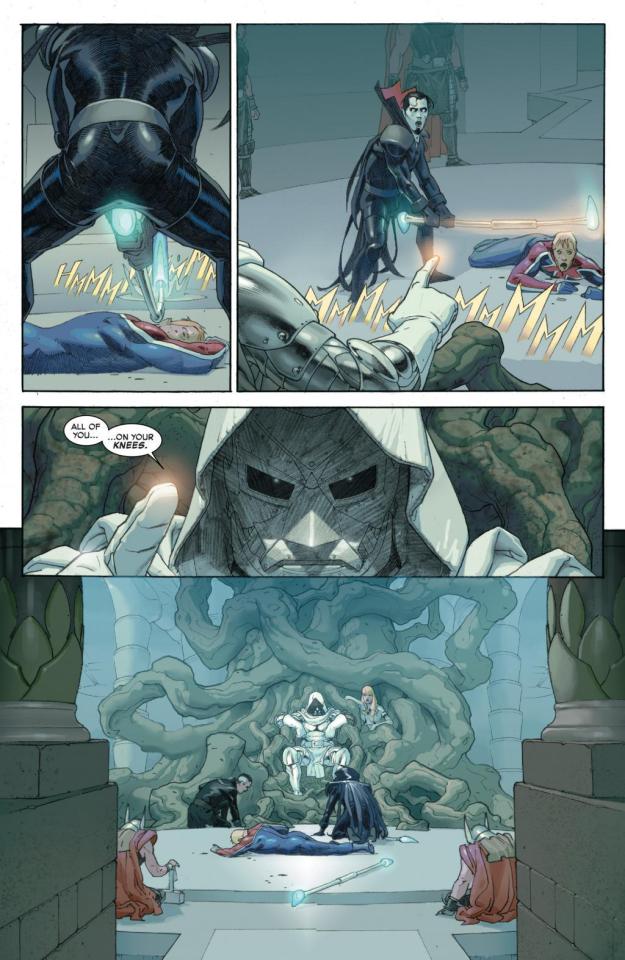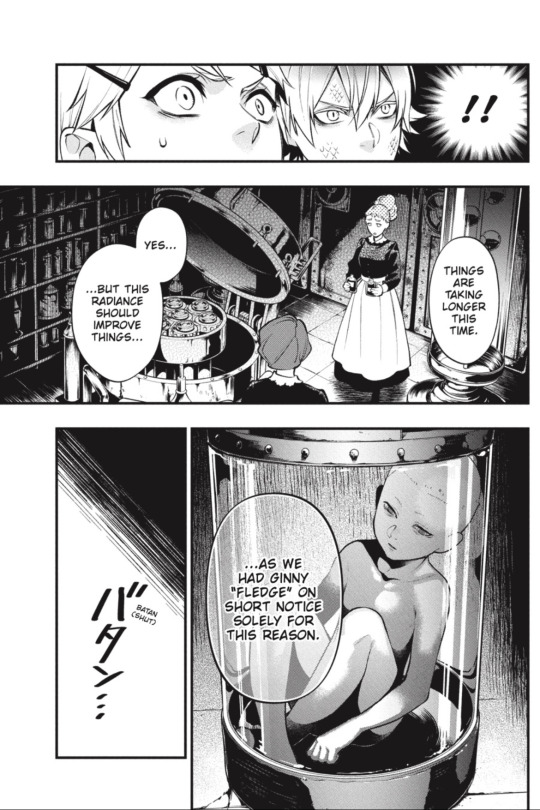#Susan Barone
Explore tagged Tumblr posts
Text

my annoying ass brain immediately thought “omg sue storm, baron zemo, and julia carpenter!”…ugh. 😭
#marvel#sue storm#susan storm#daniel brühl#sydney sweeney#julia carpenter#spider woman#madame web#invisible woman#baron zemo#zemo#baron zemo#vanessa kirby
10 notes
·
View notes
Text

"All of you... on your knees."
#dr doom#doctor doom#victor von doom#susan storm#reed richards#baron sinister#thor odinson#jane foster#captain marvel
63 notes
·
View notes
Note
Did Doll or Joker ever realize the same truth that our Ciel had about Baron Kelvin sacrificing the lives of the left-behind workshop children to use as replacement parts for the prostatic limbs?
Were Doll and Snake friends during the circus arc? And are they getting along now?
Doll did not know what the circus doctor was doing with the kidnapped children or the children from the workhouse.
Joker learns that the doctor was using the kidnapped children for that purpose, at the same time that our earl learns it. More specifically, the kidnapped children who died at Kelvin's manor. I don't think Joker ever knew for sure that the workhouse residents had succumbed to the same fate, but he might have considered it... as he was bleeding to death. But the doctor and Kelvin don't explicitly say this then. Our earl went there expecting to find a bunch of people needing help. On the way, he talks about a philanthropist who might be willing to become its new benefactor. He probably never would have travelled there if Kelvin or the doctor had announced (to our earl, Sebastian, and Joker) that the workhouse residents had been used for this purpose already.
About Snake and Doll, it seems he had/has a soft spot for her. In ch50, when he's offered a job at Phantomhive Manor, his memories of the circus troupe focus on Doll. Perhaps because Doll made such an effort to make Snake feel accepted.


It might be entirely platonic, but he does blush in ch197, when Susan asks what his relationship is with Doll.

Either way, Snake is genuinely concerned about her. Doll is acting weird at the end of ch196, but that's because of her condition as an advanced bizarre doll who needs a fresh blood transfusion. Otherwise, they seem to still get along well together.
#black butler#kuroshitsuji#snake#doll#advanced bizarre dolls#blood transfusion#joker#baron kelvin#circus doctor#circus troupe#susan#workhouse#orphanage#fol orphanage#minnesotamermaid71#asks#i answer#answered asks#ch50#ch196#ch197#character analysis
23 notes
·
View notes
Text

REVIEW
The Murder Club by Sam Baron
FBI Agent Susan Parker #2
I tried book two of this series to see if perhaps the main character, Susan, was someone I could relate to better than I did in the first book – nope – not really. I read the first eight chapters, decided to dread the end, scratched my head, read a bit in the middle and decided that was it for me and opted not to read any more. I got a feel for Susan and don’t feel she is a person or character I want to spend more time with. The characters are all seem to be caricatures and/or stereotypes rather than developed interesting people that I might want to get to know better. I am sure that other readers will find Susan and the cases she investigates perfect for them, but she is a no-go for me. Thank you to NetGalley and Storm Publishing for the ARC – This is my honest review. (2-3 Stars)
BLURB
She walked through the cabin, across the gleaming hardwood floor, past the beautiful fireplace and luxury kitchen. The view overlooking the lake was breathtaking until she stepped outside and saw the lifeless body in the chair – a silk scarf wrapped tightly around his throat, his gray eyes wide open. FBI Agent Susan Parker’s fun afternoon go-karting with her daughter is interrupted when she’s called to the crime scene of a wealthy local man murdered in his home. As she delves into his life, she discovers the man belonged to an exclusive yet sinister Murder Club obsessed with the mysterious ‘Clothesline killer.’ The previous victims were all single mothers being investigated for suspected neglect who bore the same chilling hallmark – each was strangled in her bed at night by a masked figure. But the Murder Club aren’t the only ones who have been tracking his every move… A local pizza delivery girl has been closely following the cases and building her own investigative report. Though dismissed as isolated crimes before, Susan unravels a shocking trail of clues from the girl’s scrapbook that lead to the forgotten women and orphaned children left in the killer’s wake. Then another member of the club is found dead in his ranchhouse. Determined to silence those who get in his way, and with his sights now set on Susan, can she stop him before she and her family fall prey to this elusive killer? A gripping and heart-racing keep-you-up-all-night thriller that will have fans of Robert Dugoni, Gregg Olsen and Lisa Regan absolutely hooked. Can be read as a standalone.
#Sam Baron#FBI Agent Susan Parker 2#NetGalley#Storm Publishing#Murder Mystery#Police Procedural#Serial Killer#Fiction
0 notes
Text
Narcissistic Supply - Freud & Beyond
Family Myths
After reviewing Sigmund Freud's analysis of Group Psychology, and Prestige, I wanted to explore further some of the power dynamics that remained confusing. Once people gain power and start to satisfy their deep seated cravings, those in power often feel a strange dissatisfaction that can't be easily dealt with by increasing consumption. Systems such as capitalism produce an enormous quantity of goods, which can cover the necessities of all people, and it can also be taxed and distributed through democratic socialism for those who can't find a place in the economy. Technology today looks like magic compared to Freud's time 100 years ago, and our form of happiness was heavily influenced by him. Freud felt that an advanced society would be one that supplied satisfaction without too much delay. Yet Freud noticed patients who had wealth but were still emotionally suffering. There seems to be something more that people want outside of what business and government sets out to provide. What is this indefinable target that people are looking for beyond money, beyond sex, and beyond possessions?
Freud's analysis of childhood development went some way toward answering my question. Much of what happens in adulthood was already prepared many years before with parents as role models. "For a small child his parents are at first the only authority and the source of all belief. The child’s most intense and most momentous wish during these early years is to be like his parents. But as intellectual growth increases, the child cannot help discovering by degrees the category to which his parents belong. He gets to know other parents and compares them with his own, and so acquires the right to doubt the incomparable and unique quality which he had attributed to them. Small events in the child’s life which make him feel dissatisfied afford him provocation for beginning to criticize his parents, and for using, in order to support his critical attitude, the knowledge which he has acquired that other parents are in some respects preferable to them."
As time went on, the opinions of authoritative others gained in importance for the child. Children begin measuring themselves based on how well their parents appeared in comparison to others in the community. If the comparisons turn out painful there can be a desire to falsify facts in order to recover that past feeling of superiority. "A feeling of being slighted is obviously what constitutes the subject-matter of such provocations. There are only too many occasions on which a child is slighted, or at least feels he has been slighted, on which he feels he is not receiving the whole of his parents’ love, and, most of all, of which he feels regrets at having to share it with brothers and sisters. His sense that his own affection is not being fully reciprocated then finds a vent in the idea, often consciously recollected later from early childhood, of being a step-child or an adopted child."
Taking stories and examples from the community, the children that Freud studied would challenge their own parentage as a way to distance themselves from their parents. Those examples included stories of fathers being uncertain about whether they were the true father of some of their children. It left an opening for fantasies to replace the father for someone of a better pedigree. "If these day-dreams are carefully examined, they are found to serve as the fulfilment of wishes and as a correction of actual life. They have two principal aims, an erotic and an ambitious one - though an erotic aim is usually concealed behind the latter too. At about the period I have mentioned, then, the child’s imagination becomes engaged in the task of getting free from the parents of whom he now has a low opinion and of replacing them by others, who, as a rule, are of higher social standing. He will make use in this connection of any opportune coincidences from his actual experience, such as his becoming acquainted with the Lord of the Manor or some landed proprietor if he lives in the country or with some member of the aristocracy if he lives in town. Chance occurrences of this kind arouse the child’s envy, which finds expression in a phantasy in which both his parents are replaced by others of better birth. The technique used in developing phantasies like this depends upon the ingenuity and the material which the child has at his disposal. There is also the question of whether the phantasies are worked out with greater or less effort to obtain verisimilitude."
Beyond money, sex and possessions, what people are looking for is recognition. The peak of recognition for most people's lives, outside of rare examples, was in infancy. Freud often calls an infant, "his majesty, the baby." The only thing remotely close to that experience in adulthood is to be an heir to a throne in reality. The newborn baby is the most important thing in most parent's lives, and the attention and recognition given to the child is unsurpassed. For Freud a deep memory of these times was imprinted in the unconscious and it motivated all future desires for recognition. Recognition is often so rare for most people that when it happens, they can get very emotional. "Indeed the whole effort at replacing the real father by a superior one is only an expression of the child’s longing for the happy, vanished days when his father seemed to him the noblest and strongest of men and his mother the dearest and loveliest of women. He is turning away from the father whom he knows to-day to the father in whom he believed in the earlier years of his childhood; and his phantasy is no more than the expression of a regret that those happy days have gone. Thus in these phantasies the overvaluation that characterizes a child’s earliest years comes into its own again. An interesting contribution to this subject is afforded by the study of dreams. We learn from their interpretation that even in later years, if the Emperor and Empress appear in dreams, those exalted personages stand for the dreamer’s father and mother. So that the child’s overvaluation of his parents survives as well in the dreams of normal adults."
Case Studies: 'Little Hans' - Sigmund Freud: https://rumble.com/v1gu93b-case-studies-little-hans-sigmund-freud.html
Narcissistic Supply
Influenced by Nietzsche, as so many are, Otto Fenichel associated one of Friedrich's more popular ideas to explain why people strive so much to increase their social status. "Why is this feeling of being powerful, of enjoying respect or honors, in itself a goal aspired to? As is well known, what is called ego psychology has only in relatively recent times become a subject of psychoanalytic research. We are beginning now to understand...the need to maintain a 'high level of self-regard' which is evidently identical with the so-called 'will to power'. This striving owes its origin to the fact that young children all feel themselves omnipotent, and that throughout their lives a certain memory of this omnipotence remains with a longing to attain it again." Omnipotence is defined in psychoanalysis as a magical belief that one can do anything one wishes.
After Freud's impact, when he introduced the concepts for the Ego, Id and Super-ego/Ego ideal, Fenichel found Sigmund's work useful when describing this need for a high self-regard. The Ego responds to the world's demands, but also has demands coming from the instincts in the Id. The instincts are looking for discharge in the world, but obstacles in the world have to be navigated by the ego. The ego directs itself with a list of ideals originating from the Super-ego. Each time the Ego achieves these ideals, a delicious sense of parental recognition in the mind appears, but like with anything in the mind, it can become too much of a priority at the expense of the rest of the psyche. Depending on how unrealistic these ideals are, stress increases with failure. One of the strange rewards for achieving difficult goals is the relief of pressure when the goal is put to rest. For many people, you can get that relief by skipping the draconian effort in the first place, and instead preserve rest. The main reason for going along with these onerous feats is the social recognition of being useful to others in society. With enough social rewards they can turn into an addiction and crowd out love altogether. Even intimate relationships can turn into just another social reward, like a gold star.
Being able to give and receive love provides that reciprocity that is required in good relationships. The problem with narcissism is with the giving. In an increasingly narcissistic society, giving love may mean giving away your time and some of the social rewards promised by authority figures. Narcissists can punish people for giving love to others, and it can motivate empathic people to begin to withhold love out of self-protection. The hope in the narcissistic mind is to be endlessly in the good graces of powerful people. But the search is doomed to frustration. For many people, it's a struggle to gain any recognition, let alone unending supplies of it. Narcissism is then prioritized and conditioned to be stronger, and love begins to weaken from a lack of development. Eventually the only thing that makes the mind feel at peace is the deranging of human emotion to pursue narcissistic supplies exclusively. This addiction is what Fenichel calls a "narcissistic requirement...As a motive for the actions of some individuals, the need of the ego to maintain its level of self-regard has a position of importance equal to that of the instinctual requirements of the id."
How this gets conditioned in childhood, can be seen in my Group Psychology review. People with Prestige have what we want and can remove their resources and presence from us, causing panic. Parents held an aura of supreme Prestige because they could withdraw their supplies of positive attention to control our behaviour. If the parents were narcissistic as well, they would be looking for supplies even from their children. "You have to make me look good." They became an early model to fear and imitate. The habit to seek those attention supplies makes such a huge impression on a child's life. The lesson of life is learned that all social exchanges are about making authority figures look good, and in turn we should seek power positions so we can demand others make us look good. "Now it's my turn! Make me look good!" When one finally attains a position of power, the desire to return to the position of "His Majesty the baby" takes over.
Like with anything that has scarcity, a lot of conflict is over that recognition, and it helps to explain the bizarre behaviours of narcissists who pay attention to only those cues of Prestige, and ignore or attack everything else. "After the original infantile feeling of omnipotence is lost, there is a persistent desire to recover it. This desire we call 'narcissistic need', and self-regard, is highest when this desire is fulfilled and lowest when fulfilment is remote...Whenever there is a discrepancy between superego and ego, that is, a sense of guilt, self-regard is diminished, while each fulfilment of an ideal elevates it." This addictive up and down helped Otto understand why people amassed wealth beyond rationality. Certainly wealth is useful, but it can lead to a feeling of emptiness if it's used ONLY to gain recognition from others. Because purchasing regard cannot guarantee results, there's an insecurity there. A need to control people's attention. In the modern world, people really do feel a pressure to buy recognition. "In so far as the drive to amass wealth appears to be a means of the ego for increasing self-regard, or for preventing a lowering of its level, this desire can be looked upon first as a derivative of that primitive form of regulation of self-regard in which the individual requires a 'narcissistic supply' from the environment in the same way as the infant requires an external supply of food. Money is just such a supply. Then, to be sure, in the present day economic system, the idea of being wealthy becomes an ego-ideal. The attainment of wealth is fantasized and striven for as something bound up with an enormous increase of self-regard."
The Hobbit - Thorin comes to his senses: https://www.youtube.com/watch?v=zLUSuwInLnw
This helps to explain why a lot of revolutionaries appear hypocritical when they gain wealth and power. They were not prepared for the temptation. The hypocrisy is caused by their need to preserve the ecstasy of narcissistic supply, and they get caught up in the same emotions as those they once criticized. In many cases the revolutionaries are even worse, because their desperation is larger due to their lack of experience with power. Those who were kicked out of power, may have been corrupt, but they had a certain boredom that controlled their greed. Then any calls from the revolution's followers to step down are seen as personal threats. Followers are also ambitious and want their turn at power. What is unconscious is the desperation people have for self-regard. The sense of survival is strangely connected with it. How this connection is explained psychoanalytically is through the concept of the body, and how this conceptualization can then expand, even beyond the sensation of the body, to appropriate objects and people in the environment. "'The ego is first and foremost a body-ego', says Freud in The Ego and the Id, and he means by this that the distinction between ego and non-ego is first learned by the infant in the discovery of its body in such a way that in its world of ideas its own body begins to be set off from the rest of the environment. The idea of its own ego arises in the conception of its own body, in the so-called 'body [concept]'. What has been termed 'psychic feeling of self' is only a derivative of this 'bodily ego-feeling'. Now the body [concept], as is well known, is not identical with the objective body. Parts of the body that are not present, such as amputated limbs, can still belong to the body [concept]; articles of clothing and the like belong to the body [concept]. Articles of property are thus objects which are possessed in the same way as one's own body, and they have a portion of the quality through which one's own ego is [conceptually] set off from the rest of the world. Possessions are an expanded portion of the ego...The inclination to possession is a derivative of bodily narcissism and is frequently an overcompensation for fear of loss of parts of the body. The drive to amass wealth seems to be a special form of the instinct of possession, made possible by the social function of money. The possessive instinct is a special form of bodily narcissism and an expression of the fear of bodily injury, made possible because of the...social function of possessions. The fear of bodily injury must also be investigated with respect to the social conditions of its origin, with respect to the questions when and why, that is, under what social circumstances the older generation begins to cultivate in the succeeding generation a fear of bodily injury." Of course, here, like I described above, parents control the access to resources and attention required for survival. The brain can then associate the survival necessity of feeding, and social recognition.
El Presidente - Bananas - Woody Allen: https://www.youtube.com/watch?v=dkYfmRwryQo
When a person becomes more wealthy, the sense of threat can still remain and decouple from basic survival needs. Rich people can feel a threat when their billions could transform only to millions. Even the general public can feel this sense of panic when the mind fantasizes about an enticing object or person, and the mere thought of denial creates a stress, emptiness, clinging, resistance, or entitlement. You can play around with this uncomfortable feeling by really thinking about something you would like to do, that you have access to right now, and then deny yourself. Right there you can feel the stress, emptiness, clinging, resistance, or entitlement, if you want to call it. Now add a powerful person, an avatar, who has control over whether you get those objects or people. The pressure is now to give them something in order to gain favour from them so they can allow you access. Their Prestige hits you with a sense of fear, and a desperation to give them what they want. The person in the position of Prestige knows they have power, and won't give unless they get. These social exchanges are usually just fine, when what is traded is of a value acceptable to both parties, but very narcissistic people prefer to take more than what they give back. The powerless person envies that position, and if they already have narcissistic habits from childhood, they will pursue power positions and exploit in the same way.
On Narcissism - Sigmund Freud: https://rumble.com/v1gtgdl-on-narcissism-sigmund-freud-narcissism-1-of-4.html
Underneath all these worries about controlling narcissistic supplies, is narcissistic wounding. The loss of that attention and respect triggers the self-concept the same as any survival fear, "and names will never hurt me," be damned. "The fear of bodily injuries, which forces on bodily narcissism the character of continually striving for the insurance of its integrity, we are accustomed to call 'castration anxiety.'"
There were some great examples of this phenomenon I found in an interview I watched from the Hollywood Reporter Comedy Roundtable. Henry Winkler talked about how disconnected the mind can get when it achieves the addictive highs of Prestige. "People come to you thinking you are other than you are, and you just have to remember, because it's like a drug. You want to believe them. You want to believe you can walk on water, and you have to just hold on and realize that you are not any taller, you don't know math any better, you are not smarter, because people think you are wonderful on television or in the movies." But when narcissistic supply inevitably runs into painful dry patches there's an opening for addictions to fill in as a replacement supply. Don Cheadle said "I know people that were, when I started, I'm not going to say who and the show, they were getting their per diem in coke."
Comedy Actors Roundtable: Sacha Baron Cohen, Jim Carrey, Don Cheadle & More | Close Up (7:55/37:15): https://www.youtube.com/watch?v=yz0bjLk9rUo
Narrative boundary violations
The Other is he who essentially steals my own enjoyment.
--Jacques-Alain Miller
What is most interesting to me is how quickly the conceptual ego becomes hostile as it expands to include objects, but also people, to control. We want their cooperation, and dislike their competitiveness. Wanting cooperation can very easily turn into an unconscious need to push ourselves into a leadership position over others. "Hey, why aren't you doing what I want?" Anxiety for the ego can be caused by a boundary violation where people make goals for Others and when those Others show independence, thwarting the ego's goals, it can feel like it wasn't independence, but betrayal. We have to watch our preferences for what we want from other people. Preferences can fly through boundaries because they are so imaginary. That feeling of being slighted betrays our need for a subtle despotism, and it's our fault if we feel bad that someone else exercised their legal independence. The freedom for all of us from this form of pain, is to concede freedom for others, and to focus on our own responsibilities. Whoever interferes with another person's goal, even if that person wasn't aware they were being secretly employed by a voyeur, will start looking like a dehumanized Other to them. A pest! The origin of dehumanization, which makes it easier for people to attack others, is conflicted goals. This is how a person can easily victimize someone who is innocent, and not even recognize their innocence. Our desire for how we want people to behave, can create again that sense of stress, emptiness, clinging, resistance, or entitlement. You can feel it tug in your chest, or there's a headache of some kind. That conceptual desire is omnipotent and can move anywhere, even through people's legal boundaries, like wanting something through a shop window. As people inevitably bump into each other, conflict escalates, and eventually everyone involved sees nothing but dehumanized Others. It's very easy to fall into these habits. Most of us feel from time to time that people should be this way or that way, but normal people stop at a certain point before action.
The Anapanasati Sutta - Gil Fronsdal & Thanissaro Bhikkhu: https://rumble.com/v1gon6r-the-anapanasati-sutta-4-stages-of-meditation.html
Where conflict can converge more intensely is when an ego-ideal is imitated by many people. Because it's so conceptual, this ideal can be shared only in the mind, but not in actuality. That means that each person is emotionally investing in the same goal, but are obstacles to each other in reality. The more applicants there are compared to positions, the more stress and conflict there is. People are either in that envied position solely, or not at all. Most normal people give up and look for different goals, but not everyone is that way. That all or nothing feeling about these status positions can make some competitors emotionally desperate. But it's difficult to understand how people can body-snatch another person's identity when explaining mimetics in this unemotional way. Yet if we look closer at the emotions, we can see that we do it all the time. In War Pt.2, I talked about Vittorio Gallese's studies of mirror neurons and how the brain maps out the goals and intentions of others before imitating them. It's not just narcissists who do this. Most people, without some rare brain damage, do this automatically. The way it's done is that the ego is constantly scanning perception for benefits to satisfy wishes, but there usually is some compass pointing for us. Most of our early wishes were modeled by parents, who were the only ones we could look to for suggestions for how to maneuver the environment to gain rewards. This habit to look to authority figures for reward-suggestions influences us throughout life, and even sets us up for conflicts later when suggestions are pointing to things that cannot be shared. We condition ourselves based on these suggestions, which are essentially pleasure procedures. If what the model has is readily available, it's not really a problem to follow the procedure. But when we get stuck in entitlement-stress-mode, we may not notice that what we want is only available to the model. We bump into them by accident and they turn from a model to a rival. Then a lot of our moods and actions are dictated by these conflicts.
Beyond the Pleasure Principle: Freud & Beyond: https://rumble.com/v1gv855-beyond-the-pleasure-principle-freud-and-beyond-war-pt.-23.html
Even when these imitated suggestions point to things that aren't scarce, they can still be hollow due to how imaginary this mind-intention-mapping process is. These promises of happiness that we map out don't always match reality. Like in my review of Group Psychology, they can be hazy, abstract and misleading. Then we can be agitated when reality doesn't match our imitated hopes. And of course, this happens over and over again. Added to the confusion between reality and fantasy, this vicarious mapping releases similar rewards for imaginary goal attainments like in the real world. This can be so much so that we are satisfied only with imagined rewards because we released enough chemical reward simply by following an enjoyable narrative to its imaginary satisfaction. Even more seductively, these imagined narratives provide less risk than in real life goals, making them a vice. Therefore, after the narrative finishes in our minds, the motivation usually ends, including the motivation to do something about our wishes in reality. We can become disconnected from reality, prefer fantasy, and lose belief in our own actions.
Will Wright's Secret to game design: Narcissism: https://www.youtube.com/watch?v=KFtt25k873U
Minority Report: VR room: https://www.youtube.com/watch?v=8tjOVOSqdQ0
Ready Player One Ending - Steven Spielberg: https://www.youtube.com/watch?v=ZYEnSsbuVMQ
Group Psychology - Freud & Beyond: https://rumble.com/v1gvcxr-group-psychology-freud-and-beyond-war-pt.-33.html
The conceptual ego can create an alternate life of it's own in these narratives, including a complete selection of emotional reactions to choose from. The emotions are stronger when actual goals are achieved, but high quality forms of art can also tease our emotions powerfully. As we follow these artful narratives, we can be reactive to imaginary success and also imaginary failure. A pseudo life. When celebrities are the imaginary life we are choosing, it can turn into an obsession, like a bodysnatching in the imagination. It's like they are inside of us when we imitate them. Our desire to control their narrative, to satisfy our wishes, can dangerously take over. A narrative boundary violation. If we don't like their real life narrative, there's a desire to manipulate it to what we want and there can be an aggression towards the role model when they inevitably act independent in real life.
Sublimation - Freud: https://rumble.com/v1gv2fr-sublimation-sigmund-freud.html
An obvious manifestation of this kind of bodysnatching is in spectator sports. People watching their favourite sport can imitate with their fantasies, identify, and expand their narcissistic cravings vicariously to a sports athlete and then criticize their poor performance because of their emotional investment in them. We feel emotionally tied to their wins and losses. The emotional investment comes from wishing for an ego-ideal to be achieved, except we expect it to be achieved by somebody else. When we wish for our team to win, we lock in our emotional investment on the athletes' actions. It's like they are performing a service for our self-esteem, and it's why we can bizarrely get so emotional over people who we may never meet. A lot of our lives are about gaining pleasure in watching others in sports and movies, as a time killer, but we may fail to notice the negative side of identification. To bask in the glory of others, disguises a dangerous impulse to want to punish those who begin to behave differently than what we wanted. We feel slighted because we were day-dreaming about being them for such a long time that what they do badly looks like they betrayed us! We feel again the stress, emptiness, clinging, resistance, or entitlement. The spectator then feels a desire to punish the player for their failed performance, as if they made the fan look bad on purpose. The sports jersey that was valued so highly, can, during a bad season, become worthless. We can collect symbols of Prestige, and those symbols can oscillate in value wildly along with our emotions and enslave ourselves with these symbols. When this kind of obsession moves into Narcissistic Personality Disorder, it can escalate to a dangerous level. The danger is when we identify with real people, and feel an enormous desire to punish them for their independence. All desires create a tension in the Freudian sense that needs discharge. If there's frustration, it triggers the aggressive parts of our brain to move into sadism to destroy the obstacles of our happiness. Except this time, the obstacle is the person we wanted to imitate. Disappointing role models can bizarrely make us feel self-hatred and we can blame them for their negative influence. In extreme cases of identification, we can try to live vicariously through our role models in our imagination, feel irritated and entitled, when their real behaviours don't conform to our omnipotent commands, and move to punish them, threatening their lives, and breaking the law. This supports a lot of the reason why stalking behaviour exists at all, how intimate partners, employers, government officials can be territorial over people as much as inanimate objects like money and real property. We can be addicted to people.
Stalking - John Lennon and Mark David Chapman: https://rumble.com/v1gvhk1-stalking-world-narcissistic-abuse-awareness-day.html
Misery - HE DIDN'T GET OUT OF THE COCKADOODIE CAR!!!: https://www.youtube.com/watch?v=pO20qU-VwgA
Django Unchained - "Broomhilda here, is my property!": https://www.youtube.com/watch?v=Ifh6xJQyufc
The Invisible Man: https://www.youtube.com/watch?v=WO_FJdiY9dA&t=2s
This addiction can start a cycle, often called the cycle of abuse. For example, Freud noticed that satisfied libido or craving becomes bored, and then partners, or other people that used to be valued, can now only be perceived with a sense of emptiness, disgust, contempt and a feeling of taking someone for granted. Abusers can then punish victims for not being stimulating enough, causing a breakdown in the relationship. This is until the craving for them redevelops with time. With separation, or the threat of it, the narcissistic ego fears a loss of supply, like a loss of a limb as described above, and has to redouble efforts at intimidation or flattery to regain that hit of intensity, comfort, and security. It's what is called in modern lingo as Hoovering. Narcissists feel empty and want to vacuum you back into their games. Then when their libido becomes satisfied again, and boredom returns, the victim is taken for granted once more. The victim's desires for leaving the relationship trigger more abuse, but also intensity for the narcissist. The independent behaviours to escape can be enjoyable for predators, if those escape attempts are not too difficult to thwart, because it increases the intensity of the relationship and reduces boredom once more. If the victim succeeds in escaping, attempts to hoover may return again, restarting the vicious cycle.
Sadism and Masochism
This dance that involves Narcissistic Supply has to do with the pain that happens when it's unavailable, that pain we feel we need to numb is self-attacking. Freud kept sadism and masochism the same in one area, that of the action of attacking, but what we choose to attack is what defines them. "Masochism is actually sadism turned round upon the subject's own ego." A big motivation of the instincts is control, including control over our self-conception, to gain pleasure in certain ways, and to avoid pain. What Freud found in the instincts was how if one form of pleasure was obstructed, the mind would try to find replacements, and often in role reversals. The most common ones he encountered in people was Sadism-masochism and voyeurism-exhibitionism. "The reversal here concerns only the aims of the instincts. The passive aim (to be tortured, or looked at [for pleasure]) has been substituted for the active aim (to torture, to look at [for pleasure]). Reversal of content is found in the single instance of the change of love into hate." The way the instincts move for Freud is to go for pleasure, master obstacles with sadism when they arise, or to give up in masochism to relieve stress, and watch someone else do the mastering instead. Each subject can look from the point of view of the subject attacking the object with sadistic control. In turn the subject can imagine themselves as the subject dominating, even when being masochistically ruled. "Sadism consists in the exercise of violence or power upon some other person as its object. This object is abandoned and replaced by the subject's self. Together with the turning round upon the self the change from an active to a passive aim in the instinct is also brought about. Again another person is sought as an object; this person, in consequence of the alteration which has taken place in the aim of the instinct, has to take over the original role of the subject. Satisfaction follows in this case also by way of the original sadism, the passive ego placing itself in phantasy back in its former situation, which, however, has now been given up to another subject outside the self." A lot of thoughts of revenge could fit into those fantasies. This theory can also explain what it's like to lose power to someone else, and why it's so important for people to maintain it, to avoid the abuse they remembered from the past when they didn't have power.
If we focus on power more than violence, it can be something we see in the workplace where the sadist has power, but has to do a lot of the work. The masochist is powerless, but benefits from less responsibility, and only dreams of gaining power. The sadist envies the easier position, and the masochist envies the ability to master. Each can switch places when there is a desire to see what it's like on the other side. I would also imagine that the younger generation starts in the masochistic position and aims to gain and keep the sadistic one by middle age. Those in power demand more for themselves, and require masochists to exploit. It's hard for the sadist to completely destroy the masochist, though, because he is needed. But the sadist remembers being in the masochistic position, and loathes to go back there. It's much better to give beatings than to take them. Those who prefer a masochistic position have little experience with power, and hence only fantasize about it, and learn to be good subordinates to garner recognition that way.
The psychological reward that power hungry people are looking for has been described in my past reviews as enjoying "duping delight" or Kernberg's "triumph against!" In Outsmarting the Sociopath Next Door, Martha Stout defined this pleasure as "emotional eating." She describes sociopaths as having an "intense desire to witness their control over us by inciting our confusion, anger and fear." This mastering desire, coming from the instincts, can learn from others and especially role-models. A masochist can learn to be a sadist.
Outsmarting the Sociopath Next Door - Martha Stout: https://www.isbns.net/isbn/9780307589088/
Doctor Sleep murder scene: https://www.youtube.com/watch?v=SJuNhKopnYc
René Girard expanded this further and how this can come about in his description that smacks of modernity in workplaces today, like a court intrigue. "[When rivals are closer together] the subject despises himself so much that he has no confidence in his own judgment. He believes he is infinitely far from the supreme Good he is pursuing; he cannot believe that the influence of that Good can reach as far as himself. He is thus not sure he can distinguish the [role-model] from ordinary men. There is only one thing whose value the masochist thinks himself capable of judging - himself, and his value is nil. The masochist will judge other men according to their perceptiveness with regard to himself: he will reject those who feel tenderness and affection for him, whereas he turns eagerly to those who show, by their contempt for him, real or apparent, that they do not belong, like him, to the race of the accursed. We are masochists when we no longer choose our [role-model] because of the admiration which he inspires in us but because of the disgust we seem to inspire in him. From the standpoint of a metaphysical hell the masochist's reasoning is irreproachable." This is one of the reasons why people sometimes stay in careers they hate, or relationships they hate, because their role-model still commands some kind of Prestige for others and themselves, through their criticizing behaviour. Masochism, without the Prestige behind the sadist makes no sense. The masochist hopes to be a sadist one day. How both masochist and sadist intertwine, as we can see in workplace bottlenecks, territorial behaviour, and any other fights for scarcity: both sides want to experience being-in-savouring situations that cannot be shared. Even more bizarre than that, is that this being is ephemeral and has more to do with the conflict.
For example, imagine the palace at Versailles and it's yours! There would be lots of excitement at first, especially if the upkeep of the palace is done by servants. Yet, as we look at our hands, age is creeping up. If you have a belly ache, will a chandelier cure it? Even if you have the best doctors, at some point, even they can't help you. A lot of the enjoyment is that controlling, emotional eating, triumphing against, and duping against submissive others. It's being gazed at with Prestige. For Girard, it's being gazed at as a deity. It harkens back to Freud's earlier description of the ego-ideal, when parents showered attention on us, and maybe even lived vicariously through our youth. It's such a high, and such a crash when that new sibling is born, or being passed over on a promotion, or being cheated on by a spouse. A castration. A narcissistic injury. "[The masochist] is more blind because, instead of following out the implications of this awareness to their necessary conclusion, instead of giving up misdirected transcendency, he tries paradoxically to satisfy his desire by rushing toward the obstacle, thus making his destiny one of misery and failure."
Deceit, Desire and the Novel - René Girard: Paperback: https://www.isbns.net/isbn/9780801818301/
Love - Freud and Beyond: https://rumble.com/v1gv5pd-love-freud-and-beyond.html
Sex in Japan: Dying for company: https://www.youtube.com/watch?v=a1jGZUbN06M
When Others are the only metrics for happiness, it's like a moth to a flame. The imitator goes right into the obstacle, the rival, because without experiences of being debased, devalued and scorned, there's no procedure on how to become a divinity. Nobody to learn from. Even politicians have to copy each other's dirty tactics to gain power, because their compass points towards power an prestige that Others have mastered. It's the same for The Master. He can then enjoy his position because of the fact that others signal desire for it. It's a constant confirmation and supply of gratification. Sadists become bored without these signals. The Master may enjoy many real advantages, but their value becomes distorted, like an overvalued stock, when a stampeding herd of imitators over-invest in their attempts to transcend their low self-esteem. The market correction afterwards is when many people finally realize that the pain is not worth it. There are many other creative places people can venture into, and the most stable societies are the ones that provide many SPOTS for people to dwell in. With modern technology and artificial intelligence overproducing, there is a need to expand the variety of positions where people can earn an income. Economic crashes, wars, and steep regulatory restrictions, narrow the options, and increase the chance of rivalry. The number of masochists increases and only the Sadists benefit from the Schadenfreude power grabs.
Essential worker - Schindler's List: https://www.youtube.com/watch?v=TDo6eHyeI8E
Delusions of Grandeur
So another problem with over-valued narcissistic narratives, is the imaginary skills we pretend to have when we are daydreaming about being someone with Prestige. Justin Kruger and David Dunning, known for the Dunning-Kruger effect, talked about this disconnect between the imaginary self-narratives and the actual skills that we have. I have a suspicion that all the conditioning we get from entertainment doesn't help us with this problem. The perception of self can be distorted by a lack of experience. Often people who are not good at a target skill, who naturally don't know what development of the target skill looks like, can over-inflate their own beliefs of how good they are when they daydream. They don't really know any better until they attempt using the skills in reality. I would also add that this phenomenon distorts people's opinions of the responsibilities of the rich. A lot of hatred is based on this ignorance. There are idle rich, trust fund babies, etc., but many of the rich are talented beyond most of the population and also work harder. Because people often only see the final product, they don't realize the effort that went into it. They may assume that it's easier than it looks. Then when people chase after their role models they may burnout when they can't keep up. Then they may also go into resentment thinking that all the role model's success was a God given talent. Resentment includes a feeling of unfairness. Daniel Coyle in the The Talent Code, described what we don't see of the top performers. They seem to "live charmed, cushy lives. When you look closer, however, you'll find that they spend vast portions of their life intensively practicing their craft." Pushing the edge of skills is what they are aiming at because they know that's what really matters. A lot of relief of envy is realizing that you don't want some of these lives that people have, because if you had to do their work, you might hate it. Or if you are truly inspired by them, you then learn to accept the amount of work that is necessary. When people remain stuck in envy and resentment, the only pleasure left is a wide variety of defense mechanisms, that appear defensive in their own minds, but are actually predatory.
A bad emotional diet
How people can enjoy chaos and schadenfreude is based on the pleasure they get when their sense of status fluctuates from a lower position to a higher one. The cycle of abuse doesn't always have to be about intimate relationships. They can include wider acquaintances. As long as there are goals, there is a need for setups and payoffs. Sometimes losing a position is necessary in order to create the need to chase a lost position. Part of the fun of trying to maintain power, is dealing with minor threats to status. The up and down and back to up again, can be a rubbing point that is targeted on purpose to manufacture narcissistic highs. When sources of supply inevitably become scarce, narcissists have to find replacements, and sometimes they find them in very strange places. The examples below are not exhaustive but common enough for most people to recognize:
Victim envy - Narcissists are envious of the attention received by victims. This can lead to Baron Munchausen Syndrome where people seek victimhood to gain those social benefits. One of the main tactics for Narcissists is to bait others to victimize them so they can ask for sympathy afterwards. For example, a strange form of envy is Holocaust Envy, where narcissists wish they could get international sympathy. Never mind all the family and friends who were lost for the survivors and the horrible memories that haunt them. Narcissists have trouble seeing that far. It's almost like someone took a vise and squeezed the head of a person until their brain became limited with narcissism, and now that's all they can work with. It's sickening because there are real victims out there, but for narcissists, it's just about the supply. If they can't be included, they feel left out. This can be seen in facial expressions that are often conflated. Victims who have been wounded several times have a look on their face of hyper-vigilance and they are always on guard anticipating abuse. It's a horrifying reality for them, but narcissists have their own version of that. What people get confused about is that predators have an entitlement wound, and onlookers might reward the wrong motivation because they confuse it with the actual look of the victimized.
Holocaust Envy: the Libidinal Economy of the New Antisemitism,” Journal for the Study of Antisemitism, Vol. 3, No. 2 (March 2012): 489-505.
Pleasure in disasters - Pleasure for narcissists can be attained when celebrities fall to misfortunes and scandals, real or imagined, as can be seen in tabloids, and news reports. Pleasure can also be achieved when there are natural disasters, wars, economic crashes and epidemics. Of course this is only when the person enjoying the schadenfreude is not affected.
Beware of the left's degrowth movement - Real Clear Politics: https://www.realclearpolitics.com/articles/2020/04/15/beware_the_lefts_degrowth_movement_142942.html
Leverage - When people feel needed, due to their leverage over others, there can be a sadistic pleasure in torturing people in lower power situations who need you and can't get away. Constant threats of firing employees, threats of dumping an intimate partner, essentially threats to withdraw resources, can be something that is relied upon for quick signals of superiority and narcissistic highs.
Exploiting weakness - One of the major ways that schadenfreude can motivate people to do the right thing is to hunt for weaknesses to criticize. Sometimes it can positively motivate workers to enhance their skills. It can motivate watchdogs. Unfortunately, if there are no weaknesses to be found, there's a temptation to sabotage, or to invent criticisms by spinning perspectives to create a critical atmosphere around a rival. This is quite easy to do when objectives are uncertain, abstract, hazy and open to dispute. Pointing out weakness is also a prime method for taking power. Most narcissists, and you'll notice their facial expressions of contempt and disgust, use criticism to gain leverage. When power is achieved, then they can dump on followers who can't get away, and eliminate other critics who threaten their position.
Dividing and conquering - Creating threats and chaos to make subordinates rival for your attention can give you signals of superiority and pleasure. "People are actually fighting for me. I must really be important." This also allows consolidation of power by distracting possible rivals. Rivals also learn these tactics themselves and have the potential to lose their moral compass to follow these types of rewards. Dividing and conquering can also support the scapegoating mechanism where leaders can distract the populace by aiming them at another target, creating a sense of security. People want to be on the comfortable other side of the accuser.
Return of the Jedi - Palpatine, Vader and Luke: https://www.youtube.com/watch?v=U1MnMA0TzGI
Posterity - Since the ego-body is a concept, it can move through time in unrealistic ways. Creating art, poetry, monuments, political legacies are all forms of pleasure that people can bask in while they are alive. One of the few good feelings a person can have before death is to know that they made a huge impact. Of course this can be healthy or unhealthy depending on how positive or negative those impacts were. Some pathological people get a high out of mass shootings, for example.
Vicarious narcissistic supply - Being associated with others who have Prestige, can also be fed on by the ego. People who work with the prestigious, or friends and intimate partners, tend to also gain collateral positive attention. For many people it can be an unconscious goal to associate with cool people. Minor forms of this would be selfies with a favourite artist or celebrity. Pathological forms would be complete idealization and identification with the person of Prestige leading to controlling behaviours.
Drowned world/Substitute for love - Madonna: https://www.youtube.com/watch?v=6rsdGjNWiIw
Being in a negative spotlight - Sometimes not achieving an ego-ideal, and failing in spectacular fashion can create a buzz that offers a form of pleasure. Being ignored and not talked about can often feel worse for a narcissist than being in the spotlight, even if it's negative. Many forms of reality TV can highlight stars in an negative light to make them seem more approachable and at the same time keep them in the minds of audiences. An inverse form of relevance.
Destroying another's self-esteem - Another area of pleasure for narcissists are areas where their abuse can be creative. A lot of the reason they ask so many personal questions is because they want to find out every scrap of information they can use to make fun of you. Because their sense of love and empathy is deranged and regressed, they don't care about your humanity. They know that people can get triggered by their sore inferiority complexes, so they often will provide creative reminders so that you will notice them and get triggered with stress. Anything in your life that you haven't developed, any failure, any addiction, any mistake will be constantly displayed in your environment, or brought up in casual conversation to impinge on your consciousness and make you doubt yourself. The second blow with that method is the stress and how it slows you down wasting your time ruminating. This can then trigger a further sense of inferiority, solidifying it in a loss of momentum. Many victims develop C-PTSD, and learned helplessness. Because narcissists envy and hate your skills, and potential, you are less likely now to use them.
Star woman wrestler bullied to death: https://knewz.com/wrestler-bullying-woman-death/
Leveling - Another motive for this behaviour of damaging the self-esteem of others is called Leveling by Kierkegaard as he wrote it in The Present Age. "Leveling at its maximum is like the stillness of death, where one can hear one's own heartbeat, a stillness like death, into which nothing can penetrate, in which everything sinks, powerless. One person can head a rebellion, but one person cannot head this leveling process, for that would make him a leader and he would avoid being leveled. Each individual can in his little circle participate in this leveling, but it is an abstract process, and leveling is abstraction conquering individuality." This is like in Freud's description of group spirit in Group Psychology, if you have any skills or distinctive advantages, they cannot be allowed unless everyone else can have them. George Orwell said of these despotic environments that they were like a "a boot stamping on a human face –forever." If the body cannot be crushed then the spirit has to be. This is what individual group members that join the pile-on of leveling fail to notice, which is what is done to the scapegoat will eventually be done to them when they show any independence. They will be leveled.
Bullet with Butterfly Wings - Smashing Pumpkins: https://www.youtube.com/watch?v=8-r-V0uK4u0
Tempting you from your moral compass - Narcissists also hate your morality and especially any attempts you make to improve your ethics. They scour targets for compromising information to collect moral inventories to shame you with, even if they have their own sordid history. They will always tempt you, bait you to do the wrong thing, get in trouble, or even better, to guide you on a path that will lead you to your eventual suicide. Victims usually have to learn to forgive themselves if they are going to have any prospects at emotional healing.
Crazy-making - After all the damage above, narcissists behave without responsibility. They are full of entitlement based on their sense of omnipotence. After their abuse they will quickly move to deny it, and spread different narratives around as a form of reputation management. Similar to communist governments, they go into propaganda mode and attempt to erase history. It makes the victim have a nervous breakdown when nobody believes them and justice is denied. Getting away with abuse, fooling the public, and fooling the courts, is the biggest high for a narcissist or psychopath.
Stalin tried to erase people from history: https://www.youtube.com/watch?v=O2sjrGEbb5o
The 'Ratman' - Freud & Beyond: https://rumble.com/v1gu9qj-case-studies-the-ratman-freud-and-beyond.html
NPD awareness day: https://wnaad.com/
The Present Age - Søren Kierkegaard: https://www.isbns.net/isbn/9780062930859/
1984 - George Orwell: https://www.isbns.net/isbn/9780791093009/
Reputation management and Impostor syndrome
Of course those who are regularly put down in the masochistic position, will have a lot of inhibitions. If they try to improve themselves, especially in ways that are visible to the public, there can be an anticipation of abuse, intimidation, learned-helplessness and impostor-syndrome. As soon as a skill, award, or some other success is achieved, it's as if the mind is primed to expect social punishment from others trying to keep you down. It can be difficult to break into a sense of Prestige. People who never enter these prestigious groups, or slip out of them have trouble getting back into the good graces of these lordships of reputation.
One of the Social Psychologists that covered the difficulty of moving out of stereotypes and stigma was Susan Fiske. It usually requires a lot of momentum of good works, and reciprocity with others to develop a positive reputation. It can easily dismantle. Susan created a quadrant, that categorized perceptions people commonly have of others. One area is a sweet spot where people who approach us appear competent and cooperative. We automatically feel pride and admiration. Celebrities often use these tactics to control their public image and use things like philanthropy to soften any edges related to their power and success. When cooperation is absent, but a person is still competent, they will now look competitive to others. The automatic response Susan found in this category was envy. Both of these quadrants are still in the area of power, where the person viewed has at least some competence, or appears to do so.
The other two quadrants are areas that all people want to avoid. People who are incompetent, but cooperative, don't inspire hatred, but instead pity. People like the elderly are put into this category and those seeking power will want to take their place and move them into a more powerless role out of self-interest and pity. Sometimes this happens with illness, but just the perception is enough to change the power dynamic, and those in that category can become inhibited from asserting their rights. They begin to lose belief in themselves. It's an area that as people age, becomes a topic of anxiety in a world of ageism. People don't want to be relegated to irrelevance.
The lowest category is that of people who appear incompetent and competitive. Here Susan uses an example of the homeless. Of course people in that category can incite pity if they appear cooperative and non-threatening, but if the person appears threatening, the mixture of the two characteristics stirs up a disgust or contempt that increases the chances that we will reject them for positions of power in our lives. Part of the fear of rejection is that people in the vicinity of those contemptible people, are worried about mimetic contagion, and don't want to be conflated with them, and also face rejection. One doesn't want to be seen as incompetent or appear associated with those who are. Prestige is something that has to be managed and worked on constantly. People have to appear avant-garde and on the forefront of the next wave of fashion and prestige to be considered relevant. Any scandals can move the powerful person into contempt, and any appearances of being out of date, old and irrelevant can pigeon-hole people in the category of pity.
Immediately after seeing these categories one can see strategies that have to be adopted for survival. Envied groups need boundaries and are targeted for schadenfreude. Schadenfreude is the glee that people get when an envied group or individual is brought down by circumstances. Susan Fiske sites studies that measure the brain's reward centers and found that "positive social comparison activates the ventral striatum (VS)." Beyond upward movements of social comparison, the VS responds to praise, and it even responds to philanthropic motives. I particularly like her paradigm because these rewards exist in most brains, so that we realize that all of us can be culpable for a certain degree of narcissism. It's not just personality disordered people who do this. Susan says that being "the narcissists that we are, elevating ourselves is rewarding." On the negative side of reactions, scorn and contempt closely match disgust in studies. "The insula's relation to disgust is among the most reliable neural indicators of any emotion. Both the insula and the amygdala respond to various scorned outcasts, including those who are obese, pierced, or transsexual. What is more, responding to other people's disgust expressions activates the observer's own insula, a sort of mimicked, shared disgust response. To scorn another person is to view that person as inferior and potentially disgusting, so the insula findings make sense." This matches really well with René Girard's scapegoating mechanism in that accusers can count on many others to just mimic the reactivity of the accuser and feel similar feelings of contempt towards the accused. It helps to gain allies for bullies to pile on the outcast. Then when they succeed in annihilating their targets, it's possible for the accusing group to gain a mutual psychological reward. Now these reactions aren't always bad, because some people are incompetent and threatening, but these stereotypes become pathological when they are inaccurate, and the actions taken against those people are excessive.
Violence and the Sacred - René Girard: https://rumble.com/v1gsnwv-the-origin-of-envy-and-narcissism-ren-girard.html
The message from all if this is that it's important for successful people to appear cooperative, because if they are in the envied competitive group, any missteps on their part activate the reward centers of others. Successful people either have to increase their boundaries, improve security, live in homes in difficult to access areas, and/or they have to maintain a public image of cooperation that is very warm and doesn't appear fake, even if it is fake. This is also a warning for the majority of us looking for success and haven't found it yet. One has to prepare for success to respond to any bullying or sabotage that may appear. Since many people have gone through bullying while growing up, for being excellent at one thing or another, or being an easy target, it makes sense why people are conditioned to expect punishment when they are about to receive rewards. It's a reliable outcome. It also matches most religions that view success with a sense of limitation. Getting success in highly competitive areas is difficult enough, but keeping it can be even harder. Having biological knowledge that people will gain pleasure at your misfortune helps to reduce stressful surprises, and one can flash a knowing smirk when a best friend or acquaintance turns cold and hostile when one gains success. The list of schadenfreude targets can be endless, but the simple way to predict it is to stick with Susan's connection between success and competitive encroachment. Any territorial disputes where you are taking a "spot" are open to this wish for vengeance, reward, and winning against those who imitated the same idea.
Us Versus Them - Mina Cikara: https://www.youtube.com/watch?v=YJgQQ_SXBm8
Cikara, M., Botvinick, M. M., & Fiske, S. T. (2011). Us versus them: Social identity shapes neural responses to intergroup competition and harm. Psychological Science, 22, 306-313.
Fiske, S.T., Cuddy, A.J.C., Glick, P. and Xu, J. (2002) A model of (often mixed) stereotype content: Competence and warmth respectively follow from perceived status and competition. Journal of Personality and Social Psychology, 82, 878-902
"Don't hate me because I'm beautiful" - Pantene: https://www.youtube.com/watch?v=jssGyRoC-3w
EXTRA featuring Catherine Zeta Jones - Rhonda B. Saunders, JD: https://www.youtube.com/watch?v=DwgMl-RVuyg
Rhonda B. Saunders, JD: https://www.youtube.com/watch?v=_QDzzXneRvE
Stalking: https://rumble.com/v1gvhk1-stalking-world-narcissistic-abuse-awareness-day.html
The Man Who Murdered Versace - Real Crime: https://www.youtube.com/watch?v=B21Hwy1ARmI
Now, this review shows a lot of the bad side of Narcissistic Supply, and it was quite difficult to find anything good about it. But there was one place where I found an example of Narcissistic Supply that was healthy, and it was described as Relatedness, the 3rd pillar of Intrinsic Motivation from Edward Deci and Richard Ryan. "Relatedness pertains to a sense of being integral to social organizations beyond oneself. By feeling connected to close others and by being a significant member of social groups, people experience relatedness and belonging, for example through contributing to the group or showing benevolence." These three pillars also include autonomy (the ability to guide one's own decisions), and competence (being able to be good at something). We are social animals but in their paradigm the individual side has to be honored enough so that members of a social group can enjoy a sense of agency. When we realize that allowing as many people to use their agency increases their motivation, then their contributions to the group are much better. We can enjoy the success of others, when we realize that their freedom is available to us. It's so much more enjoyable to choose for ourselves something we want to get good at and then share it with the rest of the public.
The other great thing is that if you are in long-term relationships with people who have pathological habits of dragging everyone down, you can reject them with no feeling of guilt. Maybe you might have a new feeling of guilt in that you should have rejected these people sooner. Some people refuse to change.
The clarity coming from these discoveries of rules and laws of human behaviour, fans away the smoke of darkness and becomes healing. We know what to expect! Freud said "what we, call chance [upon further inspection, turns] into laws; also, what we call arbitrariness in [the mind] rests on laws only now dimly [guessed at]."
_________________________________________________________________________________________________________________
World Narcissistic Abuse Awareness Day, June 1st: https://wnaad.com/
Family Romances - Sigmund Freud: https://www.isbns.net/isbn/9780099426622/
The Drive to Amass Wealth - Otto Fenichel: http://freudians.org/wp-content/uploads/2014/09/Fenichel-The-Drive-to-Amass-Wealth.pdf
On Metapsychology - Sigmund Freud: https://www.isbns.net/isbn/9780140138016/
Kruger, Justin; Dunning, David (1999). "Unskilled and Unaware of It: How Difficulties in Recognizing One's Own Incompetence Lead to Inflated Self-Assessments". Journal of Personality and Social Psychology. 77 (6): 1121���1134.
Envy Up, Scorn Down - Susan Fiske: https://www.isbns.net/isbn/9780871544896/
Delusions And Dreams In Jensen's Gradiva - Sigmund Freud: Paperback: https://www.isbns.net/isbn/9781892295897/
Self-determination Theory - Deci & Ryan: https://www.isbns.net/isbn/9781462538966/
Psychology: http://psychreviews.org/category/psychology01/
#family romances#sigmund freud#narcissistic supply#narcissism#stalking#Susan fiske#Social psychology#BARON MUNCHAUSEN SYNDROME#Otto Fenichel#psychoanalysis#WNAAD#Projective Identification
0 notes
Text
assorted ghosts headcannons
-pete and flower have a nice friendship because they both enjoy nature and pete loves teaching flower about different birds and plants and things (he sees her almost as one of his scouts and she looks up to him kinda like an older brother)
-hetty was so excited when alberta ended up staying as a ghost because there was finally another woman around and because she enjoyed albertas singing
-trevor is secretly invested in bodices and barons but pretends he just watches it cause it’s the only thing on and he hates it sooooo much
-hetty calls flower susan sometimes like how she calls pete peter
-thor wants sam and jay to have a kid in hopes they can see him just like hetty did
-alberta and sasappis be gossiping to no end
-pete and trevor are actually pretty good friends and watch 80s movies together cuz they remind trevor of his childhood and pete just didn’t have time to watch them when he was alive
ok that’s it the end
#cbs ghosts#ghosts cbs#hetty x trevor#hetty woodstone#ghosts us#sasappis#pete martino#flower montero#susan flower montero#alberta haynes#trevor lefkowitz
1K notes
·
View notes
Text
So I Spied Another Day...
You know it was a good show when you can’t decide whether your heart is so full from all the love and joy, or so empty because it's over.
Really do buckle up, because this is a long one.
So the show went a little like this. They played the Spies pro-shoot on a giant movie screen, but any time a song started, the audio changed to the instrumental track, the video typically faded to simple background graphics, and the cast came out to perform the number live in concert style. There were also a series of audience participation prompts up on the movie screen, such as standing to deliver a line in unison, giving Lauren a standing ovation for the Pay Attention! Reprise, enthusiastically booing Dr. Baron von Nazi and the still infuriatingly catchy Not So Bad (for anyone who’s curious, in addition to encouraging boos and yelled disagreements with von Nazi, they also cut the audience participation bit from the song).
The energy in the room was so electric and full of joy and warmth. People shouted out iconic lines, went wild for everyone’s entrances, and absolutely lost their damn minds over Curtwen at pretty much every opportunity. And the cast were clearly having just as much fun. Doing This has always been my favorite, and there was something so sweet about them singing it again all these years later. We finally got Joey performing Spies Are Forever (Evil Reprise) again and it was just as chilling and beautiful as you’d expect. And One Step Ahead was just on a whole new level. I don’t want to give anything away, but the details in that performance were INCREDIBLE.
It was simply so special seeing most of the original gang come back while also bringing some new friends along. Shout out to Mariah for coming out at the top of the show so ready to play, setting the tone for the whole evening. Shout out to James for putting his comedy chops on full display (LET JAMES BE FUNNY MORE) and dancing the hell out of One More Shot (another favorite number). And shoutout to Carlos Alazraqui (taking over the roles of Sergio and Vladimir Poopin) and Tommy Link for coming into this crazy part of our world with such enthusiasm and silliness. Brian deserves a medal for agreeing to once again play the most cringe-worthy character in all of Pulp-StarCanWrecked history, and for sounding so fucking good while doing it. Tessa was having a blast in full unhinged glory and I gladly worship at her altar. Lauren is maybe the funniest person alive and deserved her standing ovation, prompted or not. Seeing Joe Walker perform live has been Item Number One on my fandom bucket list since I moved to LA a couple of years ago, and I still can’t quite believe I managed it. I’d wondered if he’d be rusty, but honestly he sounded great; it was like no time had passed. Mary Kate still has one of my all-time favorite voices and her Tatiana remains forever engaging. Joey showed up dressed to slay as a gay evil genius Bond-movie supervillain and proceeded to thoroughly deliver on that promise. And Curt… every time I watch Spies I am increasingly blown away by what he does with this arrogant, broken mess of a character. He clearly loves Agent Mega as much as any of us, and to see a performance refined and powered by such clear and thoughtful passion is just a huge treat.
(And while he wasn’t in the cast, I can’t not mention Corey. Between his roles as director and co-writer, so much of what Spies is comes directly from him and we don’t appreciate that nearly enough. And shout out to Esther Fallick for her wonderful work as Susan and the Informant. She might not have been there in person, but her incredible performance was with us the whole time.)
I know this is preaching to the choir, but Spies Are Forever really is such a special show. It’s a story about recovery, and devastating as it can be, I think there’s also something deeply healing about it at its core. For one thing, I know it played a huge role in mending my relationship with my asexuality. I will forever be grateful to it for existing, to TCB, Talkfine, and the original cast for creating it, and to those same people for maintaining its legacy with the amount of love and care it deserves. It was a privilege to be in the room as so many people came to celebrate this miraculous little musical. There were a couple of minor tech glitches (I wonder if they’ll even include the “big one”—the projector jumping over most of the staircase scene before getting fixed—in the digital ticket version), but nothing that could even begin to damper the magic of the night.
We all know that spies never die (except for Owen and the Informant, oops). And at times like this concert, I think this special little show with its short run in 2016 will prove to be just as immortal.
#anyways I just had the best time#and it took a couple of days because I've been so busy but I had to write down how special it all really was#so grateful#spies are forever#spy another day#tin can bros#tcb#tinlightenment#agent curt mega#curt mega#owen carvour#tatiana slozhno#cynthia houston#the deadliest man alive#doctor baron von nazi#the informant#joey richter#lauren lopez#brian rosenthal#corey lubowich#mary kate wiles#mariah rose faith casillas#james tolbert#joe walker#tessa netting#tom lenk#Carlos Alazraqui
84 notes
·
View notes
Text






Grimsthorpe Castle
Hi guys!!
I'm sharing another grand english state!
House History: The building was originally a small castle on the crest of a ridge on the road inland from the Lincolnshire fen edge towards the Great North Road. It is said to have been begun by Gilbert de Gant, Earl of Lincoln in the early 13th century. However, he was the first and last in this creation of the Earldom of Lincoln and he died in 1156. Gilbert's heyday was the peak time of castle building in England, during the Anarchy. It is quite possible that the castle was built around 1140. However, the tower at the south-east corner of the present building is usually said to have been part of the original castle and it is known as King John's Tower. The naming of King John's tower seems to have led to a misattribution of the castle's origin to his time.
Gilbert de Gant spent much of his life in the power of the Earl of Chester and Grimsthorpe is likely to have fallen into his hands in 1156 when Gilbert died, though the title 'Earl of Lincoln' reverted to the crown. In the next creation of the earldom, in 1217, it was Ranulph de Blondeville, 4th Earl of Chester (1172–1232) who was ennobled with it. It seems that the title, if not the property was in the hands of King John during his reign; hence perhaps, the name of the tower.
During the last years of the Plantagenet kings of England, it was in the hands of Lord Lovell. He was a prominent supporter of Richard III. After Henry VII came to the throne, Lovell supported a rebellion to restore the earlier royal dynasty. The rebellion failed and Lovell's property was taken confiscated and given to a supporter of the Tudor Dynasty.[2]
The Tudor period
This grant by Henry VIII, Henry Tudor's son, to the 11th Baron Willoughby de Eresby was made in 1516, together with the hand in marriage of Maria de Salinas, a Spanish lady-in-waiting to Queen Catherine of Aragon. Their daughter Katherine inherited the title and estate on the death of her father in 1526, when she was aged just seven. In 1533, she became the fourth wife of Charles Brandon, 1st Duke of Suffolk, a close ally of Henry VIII. In 1539, Henry VIII granted Charles Suffolk the lands of the nearby suppressed Vaudey Abbey, founded in 1147, and he used its stone as building material for his new house. Suffolk set about extending and rebuilding his wife's house, and in only eighteen months it was ready for a visit in 1541 by King Henry, on his way to York to meet his nephew, James V of Scotland. In 1551, James's widow Mary of Guise also stayed at Grimsthorpe. The house stands on glacial till and it seems that the additions were hastily constructed. Substantial repairs were required later owing to the poor state of the foundations, but much of this Tudor house can still be seen today.
During Mary's reign the castle's owners, Katherine Brandon, Duchess of Suffolk (née Willoughby) and her second husband, Richard Bertie, were forced to leave it owing to their Anglican views. On Elizabeth's succeeding to the throne, they returned with their daughter, Susan, later Countess of Kent and their new son Peregrine, later the 13th Baron. He became a soldier and spent much of his time away from Grimsthorpe.
The Vanbrugh building
By 1707, when Grimsthorpe was illustrated in Britannia Illustrata, the 15th Baron Willoughby de Eresby and 3rd Earl Lindsey had rebuilt the north front of Grimsthorpe in the classical style. However, in 1715, Robert Bertie, the 16th Baron Willoughby de Eresby, employed Sir John Vanbrugh to design a Baroque front to the house to celebrate his ennoblement as the first Duke of Ancaster and Kesteven. It is Vanbrugh's last masterpiece. He also prepared designs for the reconstruction of the other three ranges of the house, but they were not carried out. His proposed elevation for the south front was in the Palladian style, which was just coming into fashion, and is quite different from all of his built designs.
The North Front of Grimsthorpe as rebuilt by Vanbrugh, drawn in 1819. Vanbrugh's Stone Hall occupies the space between the columns on both floors.
Inside, the Vanbrugh hall is monumental with stone arcades all around at two levels. Arcaded screens at each end of the hall separate the hall from staircases, much like those at Audley End House and Castle Howard. The staircase is behind the hall screen and leads to the staterooms on the first floor. The State Dining Room occupies Vanbrugh's north-east tower, with its painted ceiling lit by a Venetian window. It contains the throne used by George IV at his Coronation Banquet, and a Regency giltwood throne and footstool used by Queen Victoria in the old House of Lords. There is also a walnut and parcel gilt chair and footstool made for the use of George III at Westminster. The King James and State Drawing Rooms have been redecorated over the centuries, and contain portraits by Reynolds and Van Dyck, European furniture, and yellow Soho Tapestries woven by Joshua Morris around 1730. The South Corridor contains thrones used by Prince Albert and Edward VII, as well as the desk on which Queen Victoria signed her coronation oath. A series of rooms follows in the Tudor east range, with recessed oriel windows and ornate ceilings. The Chinese drawing room has a splendidly rich ceiling and an 18th-century fan-vaulted oriel window. The walls are hung with Chinese wallpaper depicting birds amidst bamboo. The chapel is magnificent with superb 17th-century plasterwork.
More history: https://en.wikipedia.org/wiki/Grimsthorpe_Castle











This house fits a 64x64 lot and features several impressive rooms, more than 29 bedrooms, a servants hall and several state rooms!
I only decored some of the main rooms, for you to have a glimpse of the distribution. The rest is up to you, as I have stated that I do not like interiors :P
Be warned: I did not have the floor plan for the tudor rooms, thus, the distribution is based on my own decision and can not fit the real house :P.
You will need the usual CC I use: all of Felixandre, The Jim, SYB, Anachrosims, Regal Sims, TGS, The Golden Sanctuary, Dndr recolors, etc.
Please enjoy, comment if you like it and share pictures with me if you use my creations!











DOWNLOAD (Early acces: June 30) https://www.patreon.com/posts/grimsthorpe-101891128
#sims 4 architecture#sims 4 build#sims4#sims4play#sims 4 screenshots#sims 4 historical#sims4building#sims4palace#sims 4 royalty#ts4 download#ts4#ts4 gameplay#ts4 simblr#ts4cc#ts4 legacy#sims 4 gameplay#sims 4 legacy#sims 4 cc#thesims4#sims 4#the sims 4#sims 4 aesthetic#ts4 cc#english manor
41 notes
·
View notes
Text
Here's the last batch of Trini parang tunes! Parts 1 and 2 here!
Have a Merry Christmas, you guys 💃🏽🎄
PS: My apologies for not including many other popular parang songs! Tumblr has this infuriating copyright protection system in place in which you get an error message uploading certain songs...it's been a gamble experimenting with which tracks Tumblr allows or bans. Not even adding a few seconds of empty air at the beginning of these "banned" tracks bypasses the system. So no Soca Santa or Anda Parrandero, among others :(
#trinidad and tobago#caribbean#west indies#west indian#trinbagonian#trinidad#trinidadian#culture#caribbean culture#west indian music#west indian culture#caribbean music#trinidadian music#parang#soca parang
6 notes
·
View notes
Text

I was wondering why I haven’t seen any mutant Diamondback terrapin OCs… well, one answer might be the time it takes for the markings x.x



Very pretty turtle though. Reminds me of dragon fruit ^~^
And yes I know Angel is a cheesy name but hey, take that up with her parents.
- creation concept:
Angel was kidnapped by the mad yōkai alchemist Baron Draxum, creator of all mutants and hater of humanity. Draxum had seen how much the turtles seemed to like Angel for some reason even though she was human so to try and persuade them to join him in destroying humanity he decided to mutate her into a mutant turtle and then leave her to be found by the turtles, a sort of example that his goal to mutate all of humanity was a positive thing.
Angel Carter: bit of a goody two shoes, responsible, always follows the rules, gets good grades, loving parents good home life, never wants for anything.
Family:
Mom: Susan Carter - next company president in training/secretary of a family owned automotive parts supply business
Dad: Eric Carter - a partner at Primrose and Co. Law firm.
Little sister: Cassie Carter. Cassie is 7.
Mackie: beloved Yorkie of the family
7 notes
·
View notes
Text
⋮ HP masterpost: founders era and characters ⋮
. . . . . ╰──╮꒰ founders era ꒱ ╭──╯ . . . . .
this is the first era of hogwarts. as the name implies, this era is the one in which hogwarts was founded. this era has a mild reliance on canon content for important events, but characterization is left almost entirely to the fandom. . . . . . ╰──╮꒰ characters ꒱ ╭──╯ . . . . . interestingly, the founders have been widely headcanoned to be the pevensie children from the narnia book series. all four founders were originally friends. ocs are important to this fanbase, as there are only 6 canon characters.
╰┈➤ godric gryffindor, founder of gryffindor house. also interpereted as peter pevensie. ╰┈➤ rowena ravenclaw, founder of ravenclaw house. also interpereted as susan pevensie. ╰┈➤ salazar slytherin, founder of slytherin house. also interpereted as edmund pevensie. ╰┈➤ helga hufflepuff, founder of hufflepuff house. also interpereted as lucy pevensie. ╰┈➤ helena ravenclaw or the grey lady, daughter of rowena ravenclaw. ╰┈➤ bloody baron or the baron, scorned lover and murderer of helena ravenclaw.
the list of completely canon characters ends here, although there are some that i found who may fit the time requirements. ╰┈➤ geriant ollivander: may have given rowena ravenclaw her wand. "active in the middle ages" ╰┈➤ merlin: he, morgan le fay, and helena were born post 982, and merlin was part of slytherin house (and perhaps taught by salazar himself) ╰┈➤ sir cadogan: friend of merlin, and a gryffindor. this friendship eventually landed him on the knights of the round table. his portrait is next to merlin's. ╰┈➤ morgan le fay: born post 982. king arthur's half-sister, and a dark witch. . . . . . ╰──╮꒰ disclaimer ꒱ ╭──╯ . . . . . EVERYTHING discussed is canon and from reliable sources such as pottermore, the HP wiki, or other reliable blogs.
#hp fandom#founders era#harry potter#gryffindor#slytherin#ravenclaw#canon#headcanon#eras#hp#am i going insane#lore#hp lore#harry potter lore#hogwarts school of witchcraft and wizardry#hogwarts houses#wizarding world#merlin#im autistic#hp founders era
12 notes
·
View notes
Note
wait go on about the theoretical point of departure
ugh well it's 'phenomenology of spirit', because in the lord-bondsman dialectic hegel argued that while both lord and bondsman develop self-consciousness through their mutual encounter, the bondsman does so first, both through recognition of the threat of death and through his direct encounter with nature through his labour; the lord, on the other hand, is dependent on the bondsman as a mediator because the lord doesn't have this direct relationship to the external world, instead expropriating the products of the bondman's labour. hegel wrote as though these were abstracted, theoretical figures, and it's true he was talking about world-historical consciousness, but he was also directly theorising in response to the newspaper coverage he was reading on the haitian revolution. so when he talked about bondsmen developing self-consciousness and no longer needing the lords, he didn't mean this in an abstract sense; he meant the literal revolution in which slaves overthrew masters and haiti gained independence.
so, when marx 'turned hegel on his head' (ie, made the analysis material), one thing that came through was this underlying understanding of alienation as something that affects both labourer (whose products are expropriated from him) and capitalist (who is not directly producing and thus not encountering the outside world except by mediation). you can see this especially in marx's earlier work, like the 1844 manuscripts, which is why i always say this is an interesting text through which to consider some of succession's premises. marx was more interested in proletarian alienation in the sense that he saw this as eventually birthing revolutionary consciousness and class solidarity, and later in his career much of the 'alienation' theorising was subsumed into his analysis of the 'commodity fetish'. 'succession', on the other hand, is a piece of psychological fiction but starts, i would argue, from sort of the other side of this theoretical point, where the interest is in the alienation of the capitalist, using of course a 21st-century media conglomerate and not the figure of the factory owner or whatever.
later in his career hegel was far less sympathetic to the bondsman and to the position of enslaved people generally. this was a shift that happened for numerous reasons, but one was that he continued to read european newspaper coverage about haiti following the revolution, a situation that involved grappling with the continued effects of french colonialism, from internal social tensions to the difficulty of shifting away from the monocrop economy the french had imposed. make no mistake that this was not how haiti was covered in the papers hegel read, and instead, by 'philosophy of right' he had settled into a very different reading of slavery, which he justified in part by what he perceived as the despotism of king henri christophe, and in which he argued that enslaved africans were in fact not capable of gaining true self-consciousness and spiritual freedom. this was absolutely part of a broader trend by which europeans pointed to any 'failings' of independent haiti and, instead of seeing the legacy of pre-revolution french colonialism as well as ongoing us and french imperialism and intervention, used it as a rhetorical tool against anti-slavery, anti-colonialist, or black humanist arguments. additionally, marx had his own reasons for talking about slavery as either a bygone practice or an example of labourers being 'lazy' in contrast to the european proletariat—namely, he had specific class and racial interests in defending european labourers and using the denigration of enslaved africans in order to do so.
(my sources here are primarily 'baron de vastey and the origins of black atlantic humanism' by marlene daut; 'the fetish revisited: marx, freud, and the gods black people make' by j lorand matory; and 'hegel, haiti, and universal history' by susan buck-morss)
63 notes
·
View notes
Text
Ch204 (p2), Bodies and souls
The head matron drops that bomb from ch203 that Theo is to fledge next.

I'm a bit confused why they mention Nick, except that he would be the next candidate for real Ciel, if Theo wasn't there. I was worried for a moment there that they had already fledged Nick without us even knowing about it. However, they talk about Ginny in past tense and Nick in present tense, so he must still be there.
Gosh, this young Black lady here. I hope she turns against the orphanage, because I can tell she feels deeply that this is not acceptable. Partly, she is asking because she doesn't know everything that the head matron has already been told, or perhaps she has forgotten what she was already told. Either way, she still wonders why it has to be like this.
The head matron uses the same terms Blavat used at Sphere Music Hall: radiance, stars. However, "aptitude" has been added. She acts like it's these "stars" themselves who "possess technologies way more advanced" that theirs, as if they are from some advanced alien civilization.

It's odd for her to talk about not just their bodies but also specifically their souls. Someone has told her that their souls need to be as similar to the souls of the "stars", too, not just a match in their bodies. This reminds me of what was told (probably by Undertaker) to Chris Heathfield, and that the baron repeated to Jane.
So, I'm definitely not giving up my theory that Undertaker is experimenting with soul transplants, too, not just blood transfusions and organ transplants. To him, a soul is basically an organ, anyway, right? It could be that the best way for them to match their souls is by assessing their aptitudes. It's not just the blood typing, it's the combination of blood type and aptitude test results. And then reinforcing the similarities. She even has the nerve to call this a "clinical trial".
But Susan doesn't care too much about the details, as she hopes to use her high earnings to leave soon and open her own business, some sort of shop. I wonder where the money is coming from to keep paying such high wages, since we saw those money-donating renal patients die, but it could be coming from the hotel resort in Brighton....

Susan goes to the cold vault to get blood for Doll, and we see they have also been storing blood for the other lords of the stars. Though it's possible they don't currently have any for Sirius, which would help explain why a Pomeranian like Theo would be next.

Now this is interesting. "Things are taking longer this time"... compared to what? Last time Doll needed blood? Or something else about Doll's condition? What, exactly, is taking longer this time? 🤔
#black butler#kuroshitsuji#ch204#chapter release#chapter review#chapter analysis#fol orphanage#susan#staff#ginny#doll#blood types#blood transfusion#soul transplants#experiments#clinical trials#soul shapes#shapes of souls#theo#theodore#lords of the stars#radiance#lord canopus#lord sirius#sep 15 2023#part two#part 2
78 notes
·
View notes
Text

REVIEW
The Therapy Room by Sam Baron
FBI Agent Susan Parker #1
I nearly gave up on this book at various times while reading. This is a twisted tale that is complex and complicated but one I had trouble relating to or becoming immersed in. At times I felt like I had come into book two of a series as there was little backstory and the characters were not well fleshed out. There was a lot going on with numerous characters introduced but I never really felt I got to know them well and found them difficult to warm up to. Though the FBI team did figure out who “The Splinter” serial killer was, there were still many holes in the story that were not dealt with and hopefully will be wrapped up in future books of the series. As I was unable to relate to Susan, I probably will not continue with this series.
Thank you to NetGalley and Storm Publishing for the ARC – This is my honest review.
2-3 Stars
BLURB
It’s a typical farm kitchen. A large table fills the space, and in one of the chairs is the lifeless body of Doctor Magnusson. Under his feet and the dusty wooden floorboards lie the basement – and twelve therapy rooms. Behind each locked door, the victims are about to be rescued… When a world-renowned psychiatrist is found dead in an abandoned ranch house in the Californian Santa Carina Valley, a post-it note with the words ‘Susan Parker’ and her cell phone number is taped to the basement door. Still grieving her husband’s devastating suicide less than a year ago, FBI agent Susan Parker is taking a break from work and trying to rebuild her life as a single mom to her seven-year-old daughter Natalie. When she’s called to the crime scene of Doctor Magnusson, a chill runs down her spine. For years, Susan had been trying to hunt down the doctor, convinced he was the serial killer known as ‘Splinter.’ Someone is playing a cruel game with her, and they’ve only just begun. Desperate to speak to the twelve victims rescued from the locked therapy rooms, Susan finds herself faced with a wall of silence. Why won’t they talk? Battling her demons while confronting the toughest case she’s ever had to solve. Susan discovers a chilling truth about the true nature of ‘Splinter’ – a killer preying on those seeking therapy. But that’s not all she finds… She’s about to uncover a shocking secret behind her husband’s death – one that links him to the Splinter case. With her family’s safety hanging in the balance and her career on the line, can Susan protect her precious daughter and prevent a new killing spree before it’s too late? A totally addictive and heart-stopping page-turner that will have fans of Robert Dugoni, Charlie Donlea and Lisa Regan reading late into the night.
#Sam Baron#FBI Agent Susan Parker 1#Storm Publishing#NetGalley#Murder#Crime#Torture#Whodunnit#Police Procedural#Fiction
0 notes
Text
List of attendees to the service of Thanksgiving to the late King Constantine of Greece on 27th February 2024.
🇬🇧 Queen Camilla
🇬🇧 Princess Anne
🇬🇧 Sir Tim Laurence
🇬🇧 Princess Beatrice
🇬🇧 Edoardo Mapelli Mozzi
🇬🇧 Zara Tindall
🇬🇧 Mike Tindall
🇬🇧 Lady Sarah Chatto
🇬🇧 Daniel Chatto
🇬🇧 Prince Richard, The Duke of Gloucester
🇬🇧 Birgitte, The Duchess of Gloucester
🇬🇧 Prince Edward, The Duke of Kent
🇬🇧 George, The Earl of St. Andrews
🇬🇧 Sylvana, The Countess of St. Andrews
🇬🇧 Lady Helen Taylor
🇬🇧 Prince Michael of Kent
🇬🇧 Princess Michael of Kent
🇬🇧 Princess Alexandra of Kent
🇬🇧 James Ogilvy
🇬🇧 Julia Ogilvy
🇬🇧 Marina Ogilvy
🇬🇧 George, The Marquess of Milford Haven
🇬🇧 Clare, The Marchioness of Milford Haven
🇬🇧 Penny, The Countess Mountbatten of Burma
🇬🇧 Lady Alexandra Hooper
🇬🇧 Thomas Hooper
🇬🇧 India Hicks
🇬🇧 David Flint Wood
🇬🇧 Amory Wood-Hicks
🇬🇧 Prince Andrew, The Duke of York
🇬🇧 Sarah Ferguson
🇬🇷 Queen Anne-Marie
🇬🇷 Crown Prince Pavlos
🇬🇷 Crown Princess Marie-Chantal
🇬🇷 Prince Achileas-Andreas
🇬🇷 Prince Odysseas-Kimon
🇬🇷 Prince Aristides-Stavros
🇬🇷 Princess Maria-Olympia
🇬🇷 Prince Nikolaos
🇬🇷 Princess Tatiana
🇬🇷 Prince Philippos
🇬🇷 Princess Nina
🇬🇷 Princess Theodora
🇬🇷 Matthew Kumar
🇬🇷 Princess Alexia
🇬🇷 Carlos Morales
🇬🇷 Princess Irene
🇪🇸 King Juan Carlos
🇪🇸 Queen Sofia
🇪🇸 King Felipe
🇪🇸 Queen Letizia
🇪🇸 Infanta Elena
🇪🇸 Infanta Cristina
🇪🇸 Juan Urdangarian
🇩🇰 Princess Benedikte
🇩🇰 Prince Gustav
🇩🇰 Princess Carina of Sayn-Wittgenstein-Berleburg
🇩🇰 Princess Alexandra of Sayn-Wittgenstein-Berleburg, Countess Ahlefeldt-Laurvig-Bille
🇩🇰 Count Michael Ahlefeldt-Laurvig-Bille
🇯🇴 Queen Noor of Jordan
🇯🇴 Prince Hassan
🇯🇴 Princess Sarvath of Jordan
🇧🇬 Prince Kyril of Bulgaria
🇷🇸 Crown Prince Alexander of Serbia
🇷🇸 Crown Princess Katherine of Serbia
🇩🇪 Bernhard, Margrave of Baden
🇩🇪 Stephanie, Margravine of Baden
🇩🇪 Landgrave Donatus of Hesse
🇩🇪 Hereditary Prince Ernst August of Hanover
🇩🇪 Princess Saskia of Hohenlohe-Langeburg
Other notable attendees
Nicholas Soames (Conservative politician)
Rocco Forte (British Hotelier)
Hugh Cavendish, Baron Cavendish of Furness (Former member of the House of Lords)
Grania Mary Caulfield (wife of Baron Cavendish of Furness)
John Kerry (United States Special Presidential Envoy for Climate
Lady Susan Hussey (Lady-in-Waiting)
Sir Jackie Stewart (Racecar Driver and good family friend)
Alexandra von Fürstenberg (American Socialite)
Dax Miller (Alexandra von Fürstenbergs husband)
#i did this for the coronation so i thought i’d do this again#there will be more people who attended so if i missed anyone significant plz dm me#king constantine ii thanksgiving service#british royal family#greek royal family#danish royal family#spanish royal family
13 notes
·
View notes
Text
Okay, so my Lumax medieval romance novel AU would probably be set in England around Robin Hood times (1190s). Neil Hargrove is a baron, Billy is his heir, Susan is his second wife, and Max is his little-loved stepdaughter. Neil dies early in the book and Billy, who resents Max, sadistically arranges for her to marry the nefarious Lord Vecna, who's this kind of Bluebeard figure. (He killed one of his previous wives, Chrissy, as well as his ward Fred and his knight Patrick.) Susan does not have the wherewithal to stand up to Billy, so Max is pretty much on her own. At a tournament celebrating the engagement, though, she's charmed by Lucas, a young archer. But it turns out that he belongs to a band of outlaws, headed by Eddie Munson, who kidnap her for ransom that very night. She, however, doesn't particularly want to go back.
10 notes
·
View notes